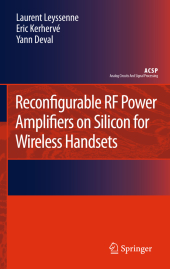 Neuerscheinungen 2013Stand: 2020-01-07 |
Schnellsuche
ISBN/Stichwort/Autor
|
Herderstraße 10
10625 Berlin
Tel.: 030 315 714 16
Fax 030 315 714 14
info@buchspektrum.de |

Yann Deval, Eric Kerhervé, Laurent Leyssenne
(Beteiligte)
Reconfigurable RF Power Amplifiers on Silicon for Wireless Handsets
2013. xvi, 168 S. 13 Tabellen. 235 mm
Verlag/Jahr: SPRINGER NETHERLANDS; SPRINGER, BERLIN 2013
ISBN: 9400734999 (9400734999)
Neue ISBN: 978-9400734999 (9789400734999)
Preis und Lieferzeit: Bitte klicken
This book provides a review of technologies, architectures and theoretical formalisms that are traditionally related to power amplifier design. It offers breakthrough solutions for the design of efficient and low-area integrated RF power amplifiers.
Reconfigurable RF Power Amplifiers on Silicon for Wireless Handsets is intended to designers and researchers who have to tackle the efficiency/linearity trade-off in modern RF transmitters so as to extend their battery lifetime. High data rate 3G/4G standards feature broad channel bandwidths, high dynamic range and critical envelope variations which generally forces the power amplifier (PA) to operate in a low efficiency "backed-off" regime. Classic efficiency enhancement techniques such as Envelope Elimination and Restoration reveal to be little compliant with handset-dedicated PA implementation due to their channel-bandwidth-limited behavior and their increased die area consumption and/or bill-of-material. The architectural advances that are proposed in this book circumvent these issues since they put the stress on low die-area /low power-consumption control circuitry. The advantages of silicon over III/V technologies are highlighted by several analogue signal processing techniques that can be implemented on-chip with a power amplifier. System-level and transistor-level simulations are combined to illustrate the principles of the proposed power adaptive solutions. Measurement on BICMOS demonstrators allows validating the functionality of dynamic linearity/efficiency management. In Reconfigurable RF Power Amplifiers on Silicon for Wireless Handsets , PA designers will find a review of technologies, architectures and theoretical formalisms (Volterra series...) that are traditionally related to PA design. Specific issues that one encounters in power amplifiers (such as thermal / memory effects, stability, VSWR sensitivity...) and the way of overcoming them are also extensively considered throughout this book.
Preface. Acknowledgments. Abbreviations.
Chapter 1 Mobile Phone Transmitters for Wireless Standards: systems, architectures and technologies. 1.1 RF Cellular/Data Transmission Standards and related Handset Uplink Architectures. 1.2 Power Amplifier Topologies for User Equipment. 1.3. Technologies for Handset PA Design. References.
Chapter 2 Discretized Reconfiguration Techniques for Radiofrequency Power Amplifiers. 2.1 Introduction on fragmented power amplifiers. 2.2 Power Amplifier Bypass Technique. 2.3 Reconfigurable Power Amplifier based on Parallelized Switched Power Cells. 2.4. Delta-Sigma Built-In Current Sensing in the Prospect of Power Amplifier Dynamic Reconfiguration. 2.5 Delta-Sigma-like Closed-loop Dynamically Reconfigurable Power Amplifier. References.
Chapter 3 Continuous Adaptive Bias Technique for Radiofrequency Power amplifiers. 3.1. Introduction and Theory. 3.2 Design and Measurement of the Integrated Passive Device dedicated to PA Module. 3.3 Design and Simulation of the Adaptive Bias Silicon PA. 3.4 Measurement on PA Silicon and PA Module. References.
General Conclusion
Appendix A Impact of base/emitter degeneration on HBT self-heating behavior.
Appendix B Small-signal analysis of a Common-source Power Stage.
Appendix C Theory of Power and Volterra series.
Appendix D Analysis of Stability in Power Amplifiers.
Index.


